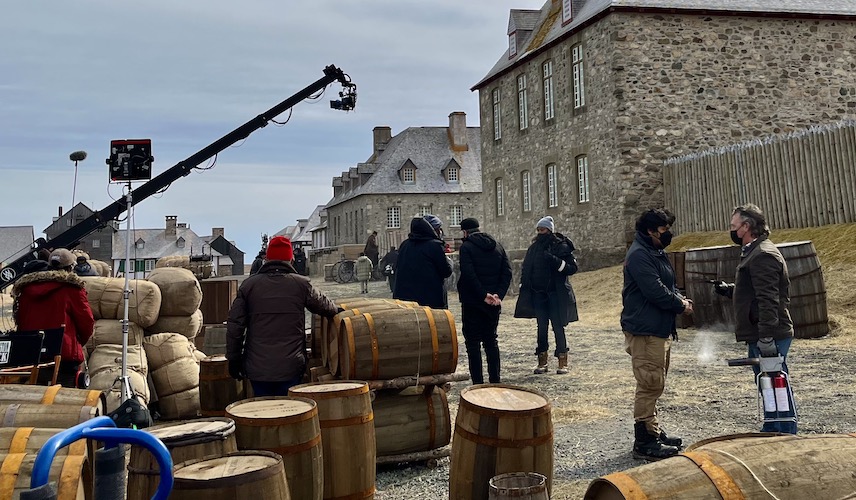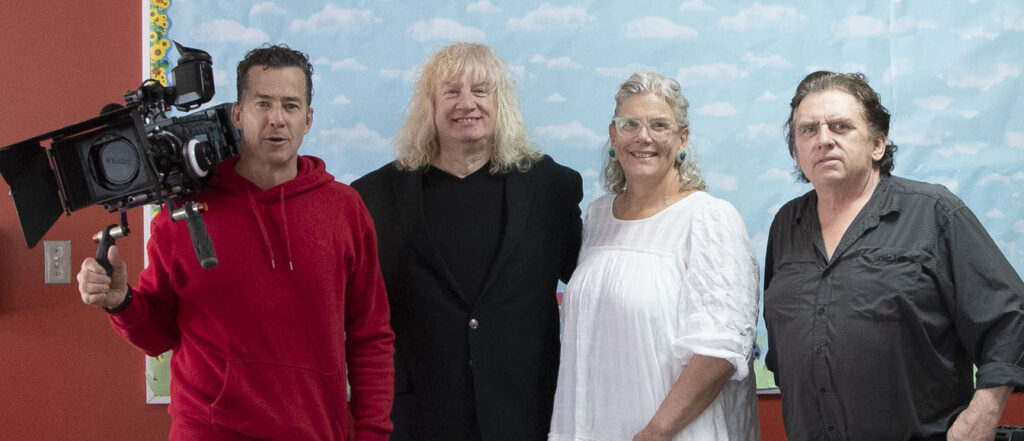…And Action! Film industry program launches in Inverness
June 3, 2025

Bill Culp, Creative Economy Development Officer with the Cape Breton Partnership, recently unveiled the Futures in Film program, which will be rolled out over the coming year.

The program had its official launch with a networking and information session at ICCA on March 25, and Culp says about 40 people turned out for the event as a number of presenters talked about opportunities in all aspects of the film industry.
“It was a blast,” Culp says. “There was great energy in the room. We had some awesome film equipment that was brought in for the occasion, including a 15-foot movie crane.”

a film credit that the co-operative hopes will bring more film production to the island. (Photos: contributed)
Presenters included Screen Nova Scotia, ACTRA (The Alliance of Canadian Cinema, Television and Radio Artists), and the Directors Guild of Canada, as well as unions representing camera operators and other film industry professionals.
“They talked about what their organizations do, and then they talked about entry level opportunities they can provide, whether it’s in training or referral programs for people just starting out,” Culp adds.
Also participating in the event were representatives from Nova Scotia Community College (NSCC), who introduced some of the programs they offer to people interested in getting involved in the industry.
“They’ve got an excellent screen arts program in Dartmouth, and now they’ve got a new program,
a one-year program called Applied Media and Communications Arts at the new NSCC Waterfront Campus in Sydney,” Culp says.
“I appreciated everyone coming,” he notes. “I think they were impressed with the amount of interest that was shown.”
Culp, who went to work for the Cape Breton Partnership in 2022, was the among the group who lobbied the Nova Scotia government to establish a film incentive for rural parts of the province, much like a similar program that’s in place in Ontario.
“So, we did our research on what was going on up there and, working with Cape Breton University and people like (Inverness County) Warden Bonny MacIsaac, we created a 65-page report to advocate for the provincial government to take on a similar sort of incentive for rural areas of Nova Scotia,”
he recalls.
Those efforts bore fruit in April of last year, when the province announced a new incentive program that will give 10 cents for each film production dollar spent on films shot 150 kilometres or more outside of Halifax.
Patrick Lanctot, one of the principals behind Inverness-based Cape Breton Film, says the incentive will help the industry on the island.
“It’s definitely going to change how producers look outside of Halifax,” he says. “With our dollar being low, and with these incentives, you’re probably going to start seeing a lot more bigger productions coming to rural Nova Scotia. If you can reduce your costs any way, that’s what you want to do.”

Lanctot operates Spectra 71, a film company based in Middle River, Victoria County, which provided much of the technical expertise for a television project Cape Breton Film shot for Bell’s Fibe TV, which aired last year. The series, called Sea Class, focused on the growing popularity of collecting sea glass, and Lanctot says a second season of Sea Class has been pitched and they should find out in May or June whether that pitch was successful.
Funding for the Sea Class project was already in place before the incentive was announced, but Lanctot says he sees nothing but positives coming out of the province’s announcement.
“It helps everything – restaurants, accommodations, antique dealers,” Lanctot explains. “A film we just shot, we used local hairdressers, we used makeup people locally. We used different shops to supply
us with props. It’s off-season stuff too. We shot that in February.”
He says the Partnership’s Futures in Film program is a great step, and he’s been working with Culp to help grow the industry on the island.
He says along with developing all elements of film production, he says he’d like to see a post- production facility established in Cape Breton.
“Right now, there are no post-production facilities outside of Halifax,” Lanctot says.
“If someone comes to Cape Breton, like a big feature, there’s no real spot for them to edit or even look
at dailies with the director at the end of the shoot day to see if there are any problems,” he explains,
“There’s a lot more infrastructure that needs to be built outside of Halifax, and that includes post- production, that includes rentals, everything.”
“Right now, everything is Halifax-based. So, it makes it a little bit more difficult for big films to come in and shoot in Cape Breton for 60 days because they have to bring in everything.”
The Futures in Film program followed the Inverness session with similar events in Victoria and Richmond counties, and Culp says “the ball is rolling” when it comes to developing the film industry locally.
“We’ve got great locations,” he says. “We’ve got a really competitive incentive program right now. We’ve got a developing workforce and we’re putting together the infrastructure virtually every day.”